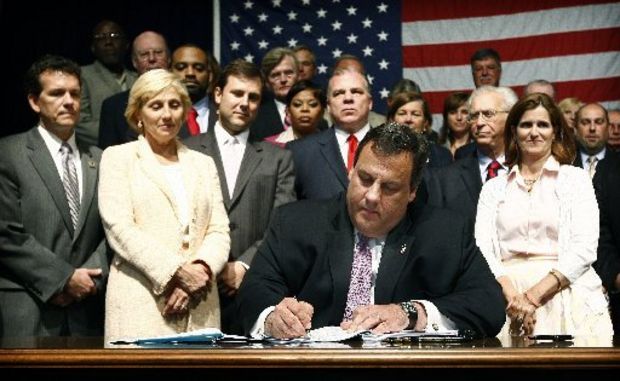
|
| Surrounded by New Jersey mayors, Gov. Chris Christie signs into law landmark pension and health benefit reform at the War Memorial in Trenton, June 28, 2011. (Governor's Office/Tim Larsen/file photo) |
|
NJ.com - Magicians use misdirection to distract the audience from noticing the real trick. Likewise, politicians use misdirection to distract voters from the real issues.
For months, Gov. Christie, a master of misdirection, has been telling the public that New Jersey public employees receive exorbitant pension benefits that are destroying the pension funds: “You cannot raise taxes enough in New Jersey to pay for the pension hole that’s been dug over the period of time that these exorbitant benefits that have been promised to people.” But a new study by New Jersey Policy Perspective disputes the governor’s use of the term “exorbitant.” According to the study, New Jersey's public employee pensions are not exorbitant, at least not compared with other plans across the country.
According to the NJPP, New Jersey's pension plans rank 95th out of the 100 largest pension plans in the nation. "I think it's crucial that we not be misguided by inflammatory statements that depict New Jersey's retirement benefits in a light that is inaccurate," said Gordon MacInnes, NJPP president, referring to Christie’s statements suggesting that New Jersey's pension benefits are overly generous. "This is a very complicated issue. Facts matter."
The reality is that New Jersey’s public employees don’t benefit as much from their pensions as almost all other public employees around the country. "New Jersey public employees face a triple whammy that gives them among the worst pensions in the country: They contribute heavily to their own pensions, receive only modest pension increases with each additional year of service, and get no inflation protection at all in their benefits," said Stephen Herzenberg, director of Keystone Research Group.
Recently, the trustees of New Jersey’s pension funds filed a lawsuit against the governor for failing to pay his legally obligated full payment to the pension fund. Earlier in 2014, the governor claimed he couldn’t honor the FY 2014 pension payment due to a “fiscal emergency.” Superior Court Judge Mary Jacobson agreed that the fiscal emergency precluded the governor from paying his committed payment only because the payment was delayed until the end of the year and there was not enough money in the budget.
Now, all three of the trustee boards, the Public Employees' Retirement System, the Police and Fire Retirement System and the Teachers' Pension and Annuity Fund, have filed a suit to require the governor to pay the full share of the FY 2015 contribution of $2.5 billion.
What’s important to note is that these boards are not composed of political opponents to the governor. The trustees, independent individuals who are responsible for overseeing the pension funds, are either elected by public employees or appointed by the governor. They serve without pay and are tasked with ensuring that the pension is run in a responsible manner. "The funding problems of the pension funds are, to quote the governor himself, the fault of prior administrations," said the chairmen of the pension boards. "And now, by scrapping his own promises while demanding sacrifices from public workers, the governor has claimed this breach of faith as his and his alone. The governor's sins of political expediency have now been visited on the active and retired employees and their families, who seek only the deferred compensation earned through a lifetime of loyal service."
The latest accounting of the pension funds shows that, as a result of more stringent accounting practices, they are projected to have a deficit of $83 billion. However, while local governments are already funding about 90 percent of the actuarially required contribution for their pension systems, the state this year funded only about 15 percent of its obligation. According to the New Jersey State League of Municipalities and the New Jersey Association of Counties, their pension systems “are fiscally sound because they have made virtually all of their required contributions over the past 15 years, while Democratic and Republican governors and legislatures have been routinely skipping their payments.”
Like any good magician, Gov. Christie has used misdirection to cast blame on previous governors, exorbitant pensions and benefits, faulty revenue projections and anything else he can find to hide the fact that he is the problem. He correctly points out that his predecessors caused the problem with the public pensions and he also took credit for fixing that problem in 2011. Yet, when his own administration failed to bring in the revenues it had projected, he used sleight-of-hand and said he couldn’t pay his obligation. Even Thomas Healy, chairman of the governor’s own Pension and Health Benefit Study Commission, stated, “They’ve all failed the citizens by not funding it.”
The governor needs to own up to his own failures and do the right thing, without waiting for the courts to order him to do so. The misdirection has not worked. The answer is obvious regardless of his political ambitions. The governor needs to make the full contribution to the pension system and get back on the path to solvency for the future of our state.
Barry Chalofsky, P.P., is a former manager in state government. He is an environmental and land-use planning consultant and an adjunct instructor of environmental planning at Rutgers University. He is also on the board of directors of the Public Sector Managers Association. Reach him at bchalofassociates.com.
This article appeared on NJ.com authored by Barry Chalofsky.
http://www.nj.com/opinion/index.ssf/2015/01/opinion_presto_gov_christie_shifts_blame_for_pension_hole.html
|
